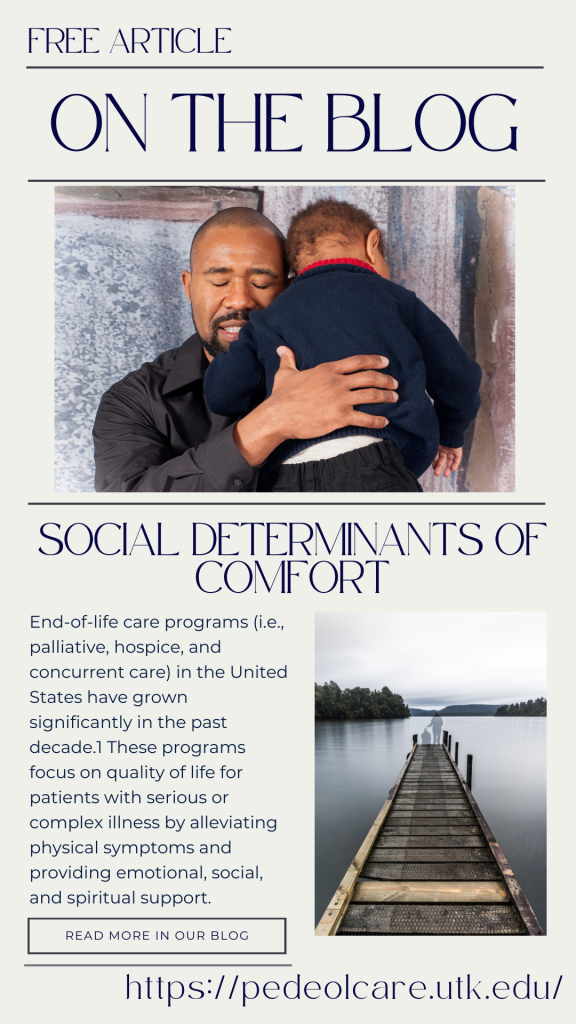Mendola A, Naumann WC, Mooney-Doyle K, Lindley LC. Social Determinants of Comfort: A New Term for End-of-Life Care. J Palliat Med. 2021 Aug;24(8):1130-1131. doi: 10.1089/jpm.2021.0209. PMID: 34339330; PMCID: PMC8309422.

Linked to PMC:
J Palliat Med. August 2021; 24(8): 1130–1131.Published online 2021 Jul 16. doi: 10.1089/jpm.2021.0209
Dear Editor:
End-of-life care programs (i.e., palliative, hospice, and concurrent care) in the United States have grown significantly in the past decade.1 These programs focus on quality of life for patients with serious or complex illness by alleviating physical symptoms and providing emotional, social, and spiritual support. However, many patients still go without comfort measures during serious illness and end of life.1 Multiple factors contribute to which measures are available, which are offered, and which are accepted by patients and their families. The fact that wide variations in comfort exist at such a vulnerable time in patients’ and families’ lives is an instance of significant social injustice, and warrants action at multiple levels of health care delivery.
We propose the term social determinants of comfort to describe structural conditions that influence whether, to what degree, and in what forms comfort measures are offered to and accepted by patients and their families. Attention to the social determinants of comfort is necessary for ethical delivery of end-of-life care, particularly in pediatric settings because children, adolescents, and young adults have complex needs and may require complex comfort-related services.2Go to:
Social Determinants of Health, of Comfort
Our notion of social determinants of comfort builds on the well-accepted concept of social determinants of health. Social determinants of health are the structural conditions that influence the health outcomes of individuals and populations,3 such as safety of the built environment, access to nourishing food, and steady income source. Research has shown that identifying and addressing social determinants of health is vital for improving health outcomes for people and populations3 by highlighting systemic barriers to health and subsequent unjust variations in well-being.
We argue that social determinants are also critical conditions of comfort at end of life. End-of-life comfort varies by patient- and family-based features,4 such as race/ethnicity, culture, insurance, and socioeconomic status; provider-based features,1 such as communication skills and familiarity with comfort care; and hospital-based features,1 such as region, urban density, and tax status.
Recognizing the social determinants of comfort is vital to eliminating health inequities that reinforce social vulnerability and disadvantage.5 Inattention to these variations compounds the vulnerabilities of some patients and families, exposing them to risk of dire outcomes during end of life and bereavement.Go to:
Implications
We believe that the term social determinants of comfort will help health care providers recognize factors that influence the comfort received by patients and families at end of life. This term highlights the cascading effects of social and health care policy, access to care, family employment, and provision and payment for services on the very real struggles of patients and families at this sensitive juncture.
We also believe the term social determinants of comfort will prompt additional research including the antecedents and consequences of social determinants of comfort, as well as operationalizing and measuring the term. This will, in turn, prompt further investigation of effective means to dissolve barriers to effective comfort-focused care.
Social Determinants of Comfort: A New Term for End-of-Life Care – PMC (nih.gov)